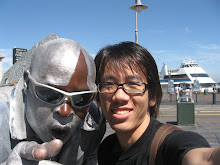the Monty Hall problem. heard of that? You would have if you watched the movie "21" regarding some MIT students' beating the odds in Vegas casinos. It's really counter intuitive, and I couldn't understand it. So while my professor was explaining using mathematical signs and symbols for probability, I scribbled on my own paper what I'm more comfortable with - pictures and simple numbers and fractions. My mind isn't built for abstract formulas. I need to see things like I see them in real life. A box. No box. 1. 2. One-third. Maybe I can deal with negative numbers.
What I don't understand is "does it matter what the host knows?"
Does it matter what his method of choosing the door with the goat to reveal is? If he has a rule that says "open the first possible door to the right of the selected door whereby the immediate right of the rightmost one is the leftmost one" or if his rule is more complicated, maybe he looks at the hands of the clock when the contestant selects the door, and then proceeds with mathematical rules before concluding according to the rules which door to open (assuming he has 2 to choose from, cos otherwise there is no choice). What if he doesn't know which door to open...he walks into a veiled booth and presses a button to open one door. If it contains the prize, the door doesn't open and he presses the other option, so that unless a door refuses to open, the host himself never knows where the prize is.
Do these things change the probability?
I can't understand. It seems to tie in with the quantum chemistry stuff in class. Something about "observing", or "measuring" changing the result. Like that test to see if light was a wave or particle...and when it was observed, or when "shots" were fired one by one, one result turned up, and when left alone to do its "thing", another result appeared. Like how when we apparently "observe" some property of a particle, its originally random properties are now defined. Some complicated thing like that. How come KNOWING, SEEING, somehow...observing....changes things?
http://en.wikipedia.org/wiki/Bertrand%27s_paradox_(probability)
under Classical Solution it seems to give some answers although to a different problem but one of similar nature. So, "random" really isn't random? The method of "randomizing" matters? WHAT!?
Now if you're going to explain the Monty Hall solution, I've already understood that...well somewhat. I just cannot understand if the host "knowing" certain things changes the probability. Check Wiki under Monty Hall, under "other host behavior" and it says that if the host didn't know, the chance is 1/2. otherwise, 2/3. WA~~~
Also, what's appalling are the consequences. It means...this. Can you calculate probability? If the probability of something happening now is the conditional probability that it happens after all that has happened in the world has happened, then without knowing all that has happened in the world before, how do we computer probability?
i.e if flipping a coin 1/2 chance goes heads, 1/2 tails, BY RIGHT. But maybe chances of getting heads today is conditional that WW1 happened, that i ate an apple on a certain date...etc...that a stone fragmented into 24 parts, not 23...etc
Wednesday, November 26, 2008
Subscribe to:
Post Comments (Atom)

No comments:
Post a Comment